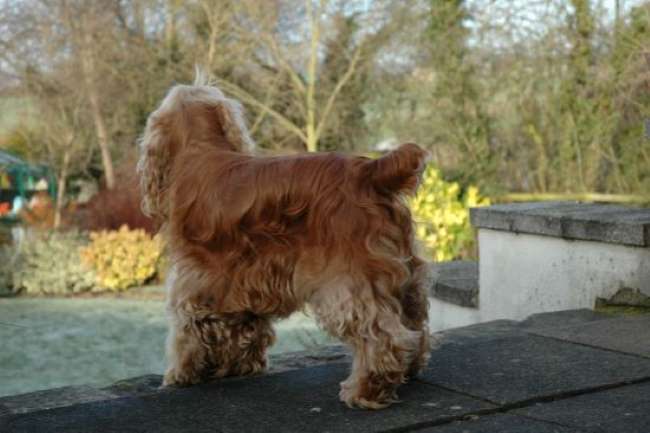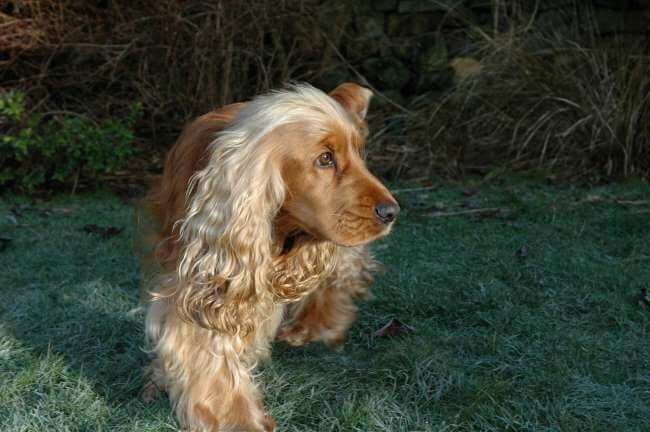- Home
- Questions about dogs and puppies
- Tail docking in dogs
Tail Docking In Dogs
Tail docking in dogs is no longer legal in the UK (in fact, it's been illegal since April 2007). However, docking puppy tails was routine for both working breeds and show dogs.
Understand what docking is, why breeders of Cocker Spaniels docked tails, and what circumstances allow tail docking today.
What Is Tail Docking?
In simple terms, tail docking is the removal of a puppy's tail.
In the excitement of hunting, a Cocker Spaniel's tail can become snagged amongst brambles or prickly shrubs and easily break or tear.
Even when they're not hunting, Cocker Spaniels are enthusiastic tail-waggers. They bang their tails unmercifully against walls and other solid objects, often resulting in them becoming broken or damaged.
Because of this, breeders and vets favoured docking puppy tails.
 Tail docking in dogs is now illegal, thankfully!
Tail docking in dogs is now illegal, thankfully!Tail Docking in Dogs: Cruel or Necessary Evil?
Tail Docking in Dogs: Is It Cruel?
Cutting off a puppy's tail sounds rather harsh and cruel, yet, it was a regular practice on the pretence of future health and hygiene for the dog.
Cocker spaniel puppies less than seven days old (usually between 2 and 5 days old) would automatically have their tails removed without using an anaesthetic.
Vets and breeders reassured owners that their puppy wouldn't feel anything because its nervous system wouldn't yet be fully developed.
They stressed that puppies wouldn't feel any pain when they had their tail snipped.
If a puppy's tail is removed, the risk of infection needs to be carefully managed for a few days until the wound is healed.
The puppy's balance will be affected, but it will adjust within a few days.
This snip was known as prophylactic docking, a procedure used in anticipation of future damage.
Thankfully, tail docking in Cocker Spaniels is now an illegal practice in the UK; however, there are exceptions.
Exceptions to Tail Docking in Cocker Spaniels
 Max is still beautiful, even if he doesn't have his tail!
Max is still beautiful, even if he doesn't have his tail!Tail docking Cocker Spaniels is legal where a vet sees regular damage to the dog's tail as a result of accidental injury during hunting or the dog's tail is diseased.
This procedure is known as therapeutic docking.
Where the vet recommends tail docking for an older dog, it would need to be anaesthetised because its nervous system would already be developed. Without anaesthetic, the dog would feel pain.
Tail Docking in Dogs: Automatic Removal
My dog has a docked tail, but that's because the breeder automatically had it removed when he was one week old without my knowing about it.
As I said earlier, docking puppy tails was a tradition until 2007, and although I love Max the way he is, I would have loved for him to have kept his little tail.
I'm sure Max would have loved to hang on to his tail too!
Many argue against tail docking in dogs; however, some are all for it!
Visitors regularly ask questions raising these arguments to this website, so I've set out a selection of them below.
Read on, and you'll discover how controversial the subject of tail docking in dogs has been.
Thank goodness this process is now primarily illegal!
Tail Docking in Dogs - Yes or No?
Should I Have My Cocker Spaniel's Tail Docked?
On the 2nd of February 2014, I was given a 5-week-old golden brown cocker spaniel whose tail is intact; it hasn't been clipped yet.
Can I leave it as it is, or should I have it removed?
Is there a health risk to docking puppy tails? Is it recommended, or should I keep his puppy tail long?
Sorry for all the questions, but I will be speaking with my vet in a few days when he goes for his first comprehensive health visit, and I would like to be well-versed on this topic.
So, in essence, is Cocker Spaniel tail docking recommended or not?
Please Note: These questions and answers below relate to before 2007 when tail docking in dogs was perfectly legal, and recommended by most vets and breeders.
Questions About Tail Docking in Dogs
Hi there!
Your dog has no health risk by leaving his beautiful long tail as it is, so you've no worries there.
Tail docking in dogs and puppies is very common, and breeders remove their puppy's tails within the first week of birth.
This is mainly tradition, as it helps create the standard cocker 'look', especially in the show Cocker Spaniel.
 Come on Mum, kick the ball!
Come on Mum, kick the ball!However, where the dog is used in hunting, there's a risk that the tail becomes snagged or badly damaged.
Working dogs with tails often return home with their tail damaged and bleeding; if it's damaged often enough, the dog may need to have his tail docked.
For this reason, most working Cocker Spaniels have their tails docked when they're around 5 days old.
Once removed, there is a small risk of infection at the tip of the tail, so it would be closely monitored.
A dog with a short stumpy tail has a downside as the dog may be at a slight disadvantage compared to other dogs.
For example, amongst other things, dogs use their tail to communicate how they feel.
By observing the tail, other dogs (and humans) can tell whether or not the owner of the tail is friendly, fearful, threatening or aggressive.
A docked tail isn't a very effective rudder in the water, nor can it help with balance as much as a long tail.
At the end of the day, the decision is yours.
If your cocker spaniel isn't going to be used for hunting purposes; he's simply going to be a family pet; I wouldn't dock his tail.
There are many cocker spaniels with full tails, and personally, I love the look and wish my Cocker Spaniel still had his little wagging tail!
I know what I would do, but, as I said, the decision is yours.
Let's see what our other visitors think, shall we?
Visitor Comments: Tail Docking in Dogs
Tail Docking for Working Cocker Spaniels
Tail Docking in Dogs - Yes or No?
By: Rob
I'm talking about working dogs with docked tails, not show dogs.
I understand how everyone feels about this. However, I actually hunt with my field-bred English cocker spaniels, and these dogs hunt in dense brush and fields for upland game birds for food.
I've been hunting with working Cockers Spaniels for over 40 years. Their tails need to be docked to accomplish what they've been bred for.
I have seen dogs that have not had their tails docked, and it isn't pretty.
The great outdoors beat the living daylights out of these dogs, especially their tails.
I believe that showing sporting dogs that have been engineered for better coats and away from their original purpose as working dogs is wrong.
If you want a companion pet, please don't acquire a sporting dog; there are many other breeds to choose from.
Cocker Spaniel Tails Are Crazy!
Their tails are crazy
By: Dan
We've just been forced to have our 2-year-old cocker's tail docked because of repeated injuries and the significant risk of infection and necrosis.
His tail was beautiful but absolutely crazy. He'd wag it so hard that it would hit walls, table legs and other objects with incredible force.
He had a bald spot on it from about 6 months old where he kept knocking it, but it never seemed to worry him, and the vet was happy to leave it as it was.
However, in the past couple of months, we noticed blood trails around the house, which we quickly saw were coming from a small split across the centre of the bald part of his tail.
 This is my favourite place to be!
This is my favourite place to be!The vet cleaned and dressed it; eventually, after repeated checking and redressing, it seemed to have healed. Within 2 days of taking the dressing off, it had split again.
We repeated this process four times before our vet said we had to consider docking, as she was worried about infection and necrosis developing. So, we had him docked last week.
Their tails are beautiful, and we hadn't even considered docking until this situation arose; however, we ended up having to go down that route for medical reasons.
When they are excited, the tip of the tail is like a whip, and the crack it makes when it hits the wall, or a piece of furniture is sickening.
I'm pleased to say the operation went well, and he's recovering. His balance is slightly off, but we are told it will return as he readjusts.
I just wanted to point out that docking can sometimes be necessary with this breed due to the tremendous energy in their tails and the resulting injuries that can occur.
In this case, as with all decisions regarding our dogs, we were guided by an experienced and trusted vet. Aesthetically, we loved the tail, but the dog's health and well-being had to come first.
Comment from Pauline
You're so right, Dan, about the health and well-being of your dog.
Your dog's welfare is much more important than aesthetics - a point very well made.
Thanks for posting!
Docking Is Barbaric!
Tail docking-Yes or No?
By: Bobbie
I have owned two beautiful cocker spaniels; the first was ten years old when I adopted him, and he had a beautiful wagging tail.
The second was sixteen months old when I adopted her, but her tail was already docked.
I loved my dogs equally, but I think it is barbaric to unnecessarily dock a cocker spaniel's tail.
I have read, and understand, the argument for the working cocker spaniels injuring their tail while hunting, but I still feel it is cruel to intervene with nature.
If I ever "buy" a cocker spaniel instead of adopting, I will request that their tails not be docked.
Cavaliers Don't Have Docked Tails
By: Sandy
I don't understand why a Cocker Spaniel has to bed docked when King Charles Cavalier does not have a docked tail? After all, they're both spaniels.
Don't Cut Cocker Spaniel Tails!
Cocker Spaniel's tails are beautiful. They communicate using their tail; cutting them off is like removing their tongue.
By: Anonymous
Leave Their Tails Long!
We adopted our undocked English Cocker Spaniel when he was 2-3 years-old.
He'd been abandoned, so we didn't have any history about his background or previous owners.
We love his long tail and think every non-working cocker should have its tail left intact.
I can't imagine my faithful Ritz Carlton without his beautiful appendage!
By: Jenny
Breeders Wanted
Say No To Tail Docking Cocker Spaniels!
I'm looking for a working cocker spaniel, but I don't want his tail docked.
I've yet to find a breeder who will leave the puppy's tail intact. I'm shocked at this because the more I read on this forum, the more I realise that so many people are against it.
If anybody knows of any breeders who may help, please could you reply, and we can swap details.
Many thanks.
By: Alan
 There's nothing in it Mum!
There's nothing in it Mum!Wanted: Undocked Puppies!
I, too, am looking for a breeder that doesn't dock tails.
Does anyone know of any?
By: Kathryn
Tail Docking in Dogs - It's A 'No' From Me!
When I bought my lovely blue roan English cocker girl, I was so pleased with her beautiful un-docked tail.
Rosie has been my companion for 5 years and, to my horror, has fractured her tail twice!
My older girl is docked and has no problems.
By: Anonymous
HRH Prince George's English Cocker Spaniel
Today I was looking at the July 16th photos of the little Prince's black dog, Lupo.
I wondered if the dog's tail had been docked and if this custom is still practised in England, but unfortunately, I couldn't find out.
A darling dog and an adorable three-year-old Prince; don't they make a charming couple?
I'm sure the Cocker Spaniel breed will become fashionable again, here and abroad, because of this publicity!
The Prince very obviously loves his Cocker Spaniel!
By: Anonymous
The Prince's Dog - Is His Tail Docked?
I believe the Prince's dog still has his tail.
Tail docking is now illegal in the UK; however, vets are allowed to use their discretion.
By: Anonymous
Cocker Spaniel docked tails: Don't Dock Cocker Tails!
We chose not to have our puppy's tail docked; now it's a beautiful plume.
Our Cocker uses his tail very impressively, and we are thankful we did not take it from him.
By: Brad
Stop Tail Docking in Dogs!
Why on earth do we still tolerate this horrendous act?
I guess the answer is that some superficial, ignorant people exist in this world. I would like to send these idiots to jail.
By: Anonymous
Tail Docking in Dogs
We adopted our Cocker Spaniel ,Sam, from a rescue organization when he was 2 years old.
I love that he has his tail; it makes him unique!
By: Sam's Mom
Why Would You Want To Cut Off Your Dog's Tail?
All dogs use their tails to communicate with other dogs and with us. Why would anyone want to cut their pet cocker spaniel's tail off?
By: Jessica
I'm Against Tail Docking in Dogs
Hi, please don't dock your spaniel's tail, they look beautiful with their tails, and it's cruel.
It is against the law in South Africa to dock dogs' tails.
By: Jenny
Summary: Tail Docking in Dogs
Well, it seems that we are primarily in agreement!
There is no justification nowadays for having your Cocker Spaniel's tail docked, and it's evident that many people are coming around to that view, thankfully.
I guess the only justification for tail docking is in working dogs, after severe accidental damage, or where a dog's tail is frequently damaged and is failing to heal.
And only where the vet recommends removal!
Source: BASC - The British Association for Shooting & Conservation
Photo credits for tail docking in dogs:
All photos are copyright of About Cocker Spaniels.com


